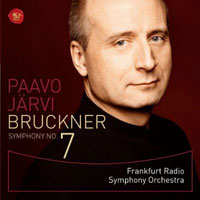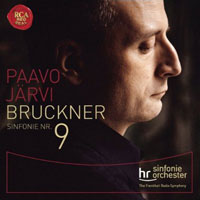Bruckner • Symphony No.7
Bruckner • Symphony No.9
reeminent among late-19th-century Romantic composers, Anton Bruckner was born in the umbrage of the village church of Ansfelden, near Linz, Austria. Imbued with a bucolic sense of nature and religious fervor, he was significantly steeped in moral and Catholic teachings. These leanings prompted his contemporaries to judge him as a country peasant, naïve and reverent. However, his inner personality exerted a powerful visionary force, and he produced large-scale works of uncompromising beauty and Beethoven-like strength of orchestration. Although densely structured, Bruckner’s symphonic output can be objectively characterized as approachable, richly tuneful and dramatically conceived in its presentation of musical concepts. For instance, the opening Allegro Moderato of the Symphony No.7 in E major projects the most enraptured and ecstatic statement found in all of Bruckner’s works -- a long, radiant phrase intoned by cellos and first horn while unfolding nobly over tremolando strings. This early music progresses in lyrical serenity, floating on waves of the convincingly ascending first subject with strings re-echoing the composer’s early Mass in D minor. Here, conductor Paavo Järvi allows the gorgeous opening melody to broaden considerably in mid-phrase, and the effect is poetic, akin to, as he put it, "water lilies sprouting their petals in water." This motif becomes the principal agent for the seraphic theme in anticipation of the movement’s coda. Among the three intertwining themes in the first movement, the ineffable lyricism and radiance of each are reiterated later in the finale, which constitutes one of the most beautiful themes Bruckner would ever conceive. Among all his symphonic output, Bruckner’s Symphony No. 9 ranks as having undergone more alterations by the composer’s pen or suggested by his colleagues than the others. The revisions in this unfinished three-movement symphony were due to Bruckner’s creative struggle resulting from his idealistic pursuit of artistic perfection. Seeking the strength to complete the symphony in his last year, 1896, Bruckner frequently invoked God’s name to allow him to complete his most meaningful work, over which he labored for nearly a decade. In fact, the symphony is dedicated to "Dem Lieben Gott," or "Our Beloved Father Almighty," for it is likewise known that a physician attending Bruckner during his final illness overheard the composer, while kneeling, once exclaim, "Dear God, let me get well soon. You see, I need my health to finish the Ninth." Sadly, he would not see that day come. Numerous past and present conductors of Bruckner’s music have understood that the key to his oeuvre is simply to allow the symphonies to evolve rather naturally at their own pace. Furthermore, proponents of true Brucknerian wisdom have kept to shaping his arching phrases with sculpted, textured precision, exactness of control and sumptuousness of orchestral sound. With Järvi’s interpretations, the overall impression is that he dwells at times on details, coupled with a slight propensity to rearrange musical content. Similarly, in his interpretation of the Seventh symphony, there is a cursory tendency to overindulge in the work’s architecture, which disrupts the continuous, flowing transitions between tempos. Järvi clearly understands that Bruckner was a man who lived in God and whose music is a cathedral with high pillars. Moreover, his interpretation of the Ninth conveys an intellectual account of the mystique of orchestral sound, with its lofty brilliance on the one hand and neo-Romantic expansiveness on the other. The orchestra displays great skill in producing an endless musical harvest of true beauty and heartfelt emotion. Järvi communicates to his musicians the same inspiration from the spiritual, universal, and transfigured atmosphere found in the Ninth, a work that bridged the 19th and 20th centuries. While Järvi’s performance of Bruckner’s Seventh remains a worthy acquisition for its soaring lyricism, brooding weight, and generally majestic sweep, I still prefer older interpretations by Karajan, Tintner, Wand, and Rosbaud. His version of the Ninth, however, will join my other favored recordings, including those traditional interpretations by Walter, Furtwängler and Wand, and the proto-modernist version by Skrowaczewski. The engineers on these hybrid SACDs deserve much credit
in producing digital sound that is transparent and warmly atmospheric. The orchestra is
acoustically clear and resonates cogently, as if one were sitting and listening with rapt
attention to a live performance. |


